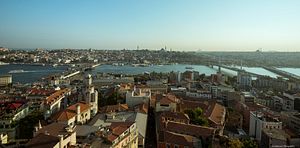Russia has long been the biggest recipient of Central Asian labor migrants, but this trend may be changing. Russian dominance as a migrant worker destination has been the product of several factors such as visa-free regimes with Central Asian countries, comparatively high wages, and the region’s familiarity with the Russian language and culture. However, in the last few years, there has been an evident decrease in the number of migrants traveling to Russia for two main reasons. First, a significant devaluation of the ruble stemming from Western sanctions made the Russian labor market economically less attractive to migrants. Second, domestic discourse on the connection between Islamic State (ISIS) terrorists and labor migrants resulted in increased raids on Central Asian nationals in Russia. These two developments have forced migrants from Central Asia to consider alternative destinations.
As the attractiveness of the Russian labor market decreased, Turkey became increasingly appealing to Central Asian migrants. According to the Turkish Ministry of Interior, Turkmenistan, Uzbekistan and Kyrgyzstan number among the top 10 countries whose citizens have held work permits in Turkey. Furthermore, in 2017, Uzbekistan also ranked among the top five countries whose nationals were captured as illegal migrants in Turkey.
Turkey, in general, has over the years become more accessible to labor migrants from Central Asia. In the aftermath of the collapse of the Soviet Union, Ankara established visa-free regimes in an effort to expand trade and the movement of people. The Turkish government put in place less restrictive regulations than the Russian government. For example, Central Asian labor migrants do not need to register with any agency for the duration of their legal stay in the country. This permits them to circumvent difficult bureaucratic procedures, whereas in Russia migrants often become victims of the corruption present in government institutions. Moreover, the public in Turkey is also more receptive to migrants from Central Asia than from neighboring Arab countries. Turks are aware of the common Turkic heritage that they share with Central Asian nationals. Additionally, the religious segment of Central Asian migrants also faces less discrimination in Muslim-majority Turkey than in Russia.
Nevertheless, Central Asian migrants still face challenges in Turkey. The public attitude toward migrants has become increasingly cautious since ISIS-recruited individuals carried out a terrorist attack at Istanbul Ataturk airport in 2016. While conflicting reports exist, many identified the attackers as citizens of Uzbekistan, Kyrgyzstan, and Russia. A few months later, another Uzbek national fired on people celebrating the New Year at a club in Istanbul. The attack resulted in 39 deaths. These incidents prompted public debate on whether Turkey should maintain its visa-free regimes with Central Asian countries whose citizens were engaging in terrorist activities on Turkish soil. Furthermore, some Central Asian communities became targets of anti-terrorist raids that resulted in deportations of Uzbek and Kyrgyz citizens. However, as Galib Bashirov, a professor at Florida International University, notes, the Turkish government has been careful not to overly stress the nationality of terrorists, instead focusing on the bigger threat emanating from ISIS. The raids against Central Asian migrants in Turkey have not been consistent even in the wake of the 2016 terrorist attacks.
To the contrary, the Turkish government has actually bolstered its support for Central Asian migrants in some ways. For example, last November, Turkish President Recep Tayyip Erdogan signed a decree to extend the period of visa-free stay for citizens of Kazakhstan, Tajikistan and Uzbekistan. Previously, citizens of these countries could stay in Turkey without a visa for a maximum of 30 days. Under the new regulations, however, nationals of the three Central Asian states can stay up to 90 days every six months. This will certainly attract more migrants from Central Asia, especially from Uzbekistan, to the Turkish labor market.
This has proven an opportunity for the Turkish government to improve its relations with Uzbekistan, in particular. During the reign of Uzbek President Islam Karimov relations between Ankara and Tashkent were strained. Ankara gave asylum to an Uzbek opposition leader, Mohammed Saleh, and harshly condemned the Andijan massacre in 2005. Karimov’s government responded by closing all Turkish schools in the country and limiting cooperation with Ankara. The change of leadership in Uzbekistan after Karimov’s fall 2016 death and the open-door policy of his successor, Shavkat Mirziyoyev, is the right occasion for Ankara to improve bilateral relations with Tashkent. Moreover, unlike Karimov’s government, Mirziyoyev’s administration has actively shown interest in the fate of its citizens working abroad.
The Turkish decree may also attract more Kazakhs and Tajiks to Turkey, but the main beneficiaries are likely to be Uzbek migrant workers. There are already more than 30,000 registered Uzbek citizens in Turkey, but only about 2,000 work legally with work visas. Kazakhstan’s economy is not dependent on migrants and for Tajiks, who are not of Turkic origin and have more difficulties with the Turkish language, Turkey may still not be as attractive a destination for work as Russia.
So far, the Erdogan’s AKP-led government has pursued rather accommodating policies toward migrants from Central Asia. However, there are nearly 3.8 million unemployed Turks in the country. More than 20 percent of the Turkish youth population is unemployed. Therefore, AKP’s policies may attract more criticism in the future from the Turkish opposition parties, which are largely anti-immigrant.
Khamza Sharifzoda is a graduate student at Georgetown University. He specializes in the politics and governance of Russia, Turkey and Eurasia.

































